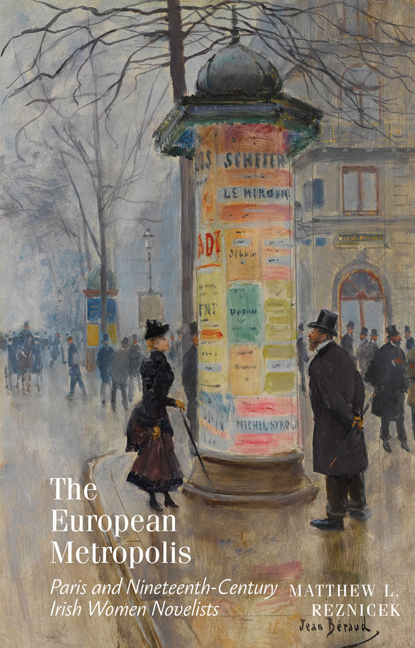Book contents
- Frontmatter
- Contents
- Acknowledgments
- Dedication
- Parvenir: An Introduction
- The Novice in the City: Sydney Owenson and the Bildung of Metropolitan Economics
- Much More than Only Le Bel Irlandois: Metropolitan Socioeconomics and Parisian Bildung in Maria Edgeworth's Ormond
- The New Jerusalem and the Rue Vavin: Urban Space, Economic Exchange, and Gendered Modernity in French Leave
- First Life-and then Fame: Gendered Fin-de-Siècle Cityscapes in Max
- A City She Must Postpone: A Conclusion
- Notes
- Works Cited
- Index
The New Jerusalem and the Rue Vavin: Urban Space, Economic Exchange, and Gendered Modernity in French Leave
- Frontmatter
- Contents
- Acknowledgments
- Dedication
- Parvenir: An Introduction
- The Novice in the City: Sydney Owenson and the Bildung of Metropolitan Economics
- Much More than Only Le Bel Irlandois: Metropolitan Socioeconomics and Parisian Bildung in Maria Edgeworth's Ormond
- The New Jerusalem and the Rue Vavin: Urban Space, Economic Exchange, and Gendered Modernity in French Leave
- First Life-and then Fame: Gendered Fin-de-Siècle Cityscapes in Max
- A City She Must Postpone: A Conclusion
- Notes
- Works Cited
- Index
Summary
Maria Edgeworth's and Sydney Owenson's work consistently engages with the European continent, with Paris functioning as an omphalos on the map of Irish women's literature. Following these earlier nineteenth-century Irish women writers, Edith OE. Somerville (1858–1949) and Violet Martin Ross (1862–1915) continued the tradition of complex connections between Irish literature and continental spaces, especially Parisian spaces. As sociological studies of the city have long claimed, it is the city that renders legible economic development and the concomitant shifts in social practices, including civic and social institutions, gender relations, and class relations. In the space of the city in Irish women's literature, capitalism occupies an undeniable role. Somerville and Ross's French Leave, a novel which has rarely been the subject of critical analysis, participates in this relationship between Irish women's European metropolitan fictions and the experience of modernity as mediated by capitalism, attempting to create a literary map of Paris's economic spaces. While Edgeworth and Owenson have also highlighted the economic spaces of the French metropolis, Somerville and Ross specifically call attention to the ways in which these spaces make legible the complex and gendered experience of fin-de-siècle Paris and its urban and economic realities.
The story of two young Irish artists, Patsey Kirwen and George Lester, who escape rural Ireland to pursue their careers in Paris, French Leave has attracted little critical attention, especially in comparison with Somerville and Ross's The Real Charlotte (1894), Some Experiences of an Irish R. M. (1899), and Further Experiences of an Irish R. M. (1908). French Leave has not been reissued since 1988. By and large, critical studies have heretofore considered it as an historical novel and focused on its biographical similarities with the authors, firmly locating it within the Anglo-Irish Big House estate. Hilary Robinson dedicates only six pages of critical attention to French Leave in her Somerville & Ross: A Critical Appreciation (1980). Robinson claims that the book is “partly an attempt at reviewing” the years before Somerville and Ross began their friendship and their creative partnership. In these years before the two cousins met, Somerville “was one of the numerous female artists enjoying la vie de Boheme in the ateliers of Paris.”
- Type
- Chapter
- Information
- The European MetropolisParis and Nineteenth-Century Irish Women Novelists, pp. 103 - 138Publisher: Liverpool University PressPrint publication year: 2017



